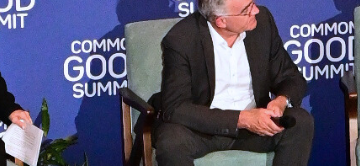Assessment of the agreement
The COP 21 summit needed to lead to an efficient, fair and credible agreement. Has it done so? The agreement announces big ambitions: warming should now stay "well below 2°C" and by 2050 the world should no longer produce net greenhouse gas (GHG) emissions; after 2020, funds for developing countries will exceed the 100 billion dollars a year that was fixed in Copenhagen in 2009. Unfortunately, despite the diplomatic success, the compromise is far short of the goal. As was aptly summarized by The Guardian[1], “by comparison to what it could have been, it’s a miracle. By comparison to what it should have been, it’s a disaster.”
Consider first the efficiency imperative. Carbon pricing, recommended by the vast majority of economists and many policymakers, but a no-starter for Venezuela and Saudi Arabia, was light-heartedly discarded by the negotiators. This seriously jeopardizes the achievement of the climate target.
A universal carbon price is indeed essential to meet the 1.5 or 2 °C goal. A carbon pricing system differentiated country by country would not only open up a Pandora's box (who pays what?), but above all would simply be environmentally unfriendly. Further rise in emissions will come from emerging and poor countries; under-pricing carbon in these countries will prevent the achievement of the climate goal. All the more that setting a high carbon price in developed countries will push GHG emitting productions to relocate to countries with a low carbon price, thus obliterating the efforts of rich countries.
In terms of fairness, developed countries have not detailed the contributions to the third world and have relied too much on voluntary contributions; but we all know that collective promises are never kept. It would be important to detail these transfers and to bring new money rather than redirecting existing funds to green projects, granting loans and allocating uncertain tax proceeds, as has so far been suggested.
And what about credibility? The agreement pushes back the concrete commitment deadline for countries to reduce their emissions. The pledge and review strategy - Intended Nationally Determined Contributions (INDC) – has won through. The promises are incomparable, they are insufficient, they would be costly if implemented, and it's a safe bet that, given they are unbinding, they will never be implemented anyway (promises committing only those who listen to them). The summit’s negotiations on transparency itself are also a failure; it’s hard to fathom why southern hemisphere countries are not to be subject to the same monitoring, reporting and verification than others. The rich countries must be generous, not bury their head in the sand. Lastly, the idea that we will adopt a more virtuous path by revising the goals every 5 years ignores what economists call the ratchet effect: are we so sure that a country will put itself in a better negotiating position in the future by blithely respecting its promises rather than "dragging its feet"?
So that makes three failures? In fact, it just makes one. It is pointless to seek ambitious green fund commitments from developed countries without introducing at the same time a mechanism capable of achieving climate goals. And we cannot ask Southern countries to make the necessary efforts without credible compensation. It takes two to tango.
What now?
This bleak midwinter picture should not shadow the reasons to be optimistic. Firstly, public awareness of climate issues has increased in recent years. Secondly, all the COP 21 countries presented trajectories of their pollution, symbolic progress on Kyoto in 1997. Finally, more than 40 countries, and not insignificant ones (USA, China, Europe ...) today run cap and trade systems, albeit with too generous ceilings and therefore very low carbon prices, but nonetheless demonstrating willingness to use a rational policy against global warming. These carbon exchanges could one day be connected together to form a more coherent and efficient global market, although the "exchange rate" question will be touchy. We need to build on this momentum.
While it is important to maintain a dialogue at the global level, the UN process has shown its very predictable limits. Negotiation among 195 nations is incredibly complex. We need to establish a " climate coalition", including from the offset current and future major polluters. I don’t know whether this should be the G20 or a smaller group (for example, the five biggest polluters, Europe, the US, China, Russia and India, representing 65% of global emissions). Besides designing an effective policy, the coalition members would try to convince the World Trade Organization to introduce an environmental-dumping-based border tax on countries refusing to impose a high carbon price.
Finally, negotiations should be simplified by separating simple measures (which should be adopted) from the real crux of the negotiation. The fight against global warming is not an economic problem (we know what to do: price carbon), but a geopolitical one. The difficult, but unavoidable, questions are those on respecting agreements and, even more so, on financial transfers among countries. Let's stop beating around the bush.
Article published by The Conversation
[1] Editorialist George Monbiot, December 12, 2015.





Add new comment